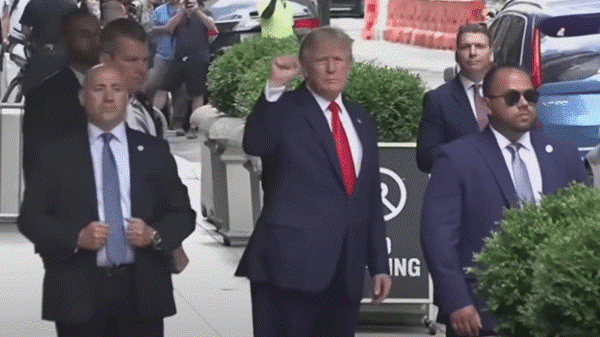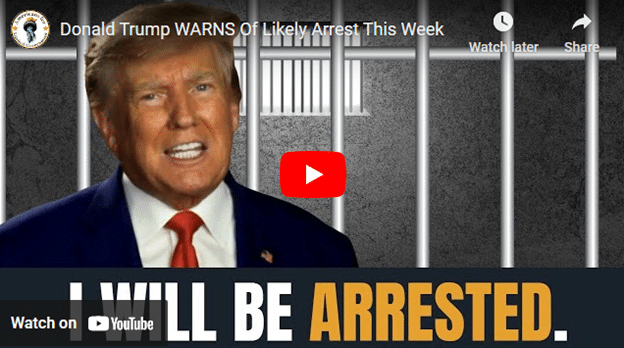March 21, 2023
Permission to republish original opeds and cartoons granted.
The indictment of former President Trump weakens the Constitution, the Article II presidency and endangers the civil society

By Robert Romano
The New York City District Attorney’s Office with its indictment of former President Donald Trump, a political opponent who is once again running for president in 2024, using a creative reading of the law on non-disclosure agreements, is just the latest in a bid to take down Trump, and poses a grave danger to our constitutional republic.
The FBI raid against Trump last August was dangerous for the same reason. So was Russiagate. Two impeachments for things he either the power to do, conduct foreign relations with a head of state, or the right to do, give a speech in which he called for protestors to “peacefully and patriotically make your voices heard,” dangerous, too.
The FBI raid itself was over something Trump had the power to do as well, a valid exercise of presidential authority under Article II of the Constitution, to declassify documents before he left office related to the Justice Department’s failed investigation of Trump that falsely accused him and his campaign of being Russian agents in 2016, and then carried the top secret investigation over into the Trump administration in 2017.
In the Jan. 19, 2021 memorandum, entitled, “Memorandum on Declassification of Certain Materials Related to the FBI’s Crossfire Hurricane Investigation,” the documents — now seized by the FBI on Aug. 8 from Trump’s house — were clearly declassified. According to the Trump memorandum, “I hereby declassify the remaining materials in the binder. This is my final determination under the declassification review and I have directed the Attorney General to implement the redactions proposed in the FBI’s January 17 submission and return to the White House an appropriately redacted copy.”
This was a lawful exercise of presidential authority to declassify military and other national security information under the Constitution’s Article II, Section 1 vesting clause: “The executive power shall be vested in a President of the United States.”
In 1988, in Department of Navy v. Egan , the U.S. Supreme Court clarified that the President’s authority over classification derives from his implicit executive powers, and not any Congressional statute: “The President, after all, is the ‘Commander in Chief of the Army and Navy of the United States.’ U.S. Const., Art. II, 2. His authority to classify and control access to information bearing on national security and to determine whether an individual is sufficiently trustworthy to occupy a position in the Executive Branch that will give that person access to such information flows primarily from this constitutional investment of power in the President and exists quite apart from any explicit congressional grant.”
The FBI investigation into Trump that began in 2016 was similarly ill predicated upon a belief that Trump was a Russian agent whose campaign had coordinated with Moscow to hack the DNC and put its emails onto Wikileaks. What began as a top secret counterintelligence investigation was carried over after Trump won the election in 2016 and into the Trump administration, effectively creating two executive branches even though Article II provides for a unitary executive.
The recusal of former Attorney General Jeff Sessions and the appointment of Special Counsel Robert Mueller added further fuel to the “get Trump” legal effort, even if ultimately resulted in Trump’s exoneration.
As Mueller noted in his testimony , referring to his report, “the investigation did not establish that members of the Trump campaign conspired with the Russian government in its election interference activities. We did not address collusion, which is not a legal term; rather we focused on whether the evidence was sufficient to charge any member of the campaign with taking part in a criminal conspiracy, and there was not.”
After all was said and done, the Justice Department could not corroborate the fantastic 2016 Christopher Steele dossier that had been commissioned by Fusion GPS, Perkins Coie, the Democratic National Committee and the Hillary Clinton campaign before they used it as the basis of several FISA warrants against Carter Page.
In his testimony, Mueller said because it was an ongoing matter at the Justice Department he simply would not answer any questions about the origins of the investigation: “I am unable to address questions about the initial opening of the FBI’s Russia investigation which occurred months before my appointment or matters related to the so-called Steele dossier. These matters are subject of ongoing review by the department. Any questions on these topics should, therefore, be directed to the FBI or the Justice Department.”
And yet the Steele dossier was certainly used by the Justice Department in the FISA warrants and the court-ordered surveillance. And it was explicit about the Trump-Russia conspiracy theory adopted by the Justice Department.
According to the 2016 dossier, Steele alleged the “Russian regime has been cultivating, supporting and assisting Trump for at least 5 years,” and alleged there was “a well-developed conspiracy of co-operation between [the Trump campaign] and the Russian leadership. This was managed on the Trump side by the Republican candidate’s campaign manager, Paul Manafort, who was using foreign policy advisor, Carter Page, and others as intermediaries.”
Steele defined the conspiracy: “the Russian regime had been behind the recent leak of embarrassing e-mail messages, emanating from the Democratic National Committee (DNC), to the WikiLeaks platform. The reason for using WikiLeaks was ‘plausible deniability’ and the operation had been conducted with the full knowledge and support of Trump and senior members of his campaign team. In return the Trump team had agreed to sideline Russian intervention in Ukraine as a campaign issue…”
It also accused one-time Trump lawyer of traveling to Prague in 2016 to coordinate with Russian intelligence officers.
But none of it was true. The Mueller report stated, “In particular, the Office did not find evidence likely to prove beyond a reasonable doubt that Campaign officials such as Paul Manafort, George Papadopoulos, and Carter Page acted as agents of the Russian government — or at its direction, control or request — during the relevant time period.”
Manafort was brought up on unrelated tax and bank fraud charges and Papadopoulos on a process crime related to his questioning. As for Cohen, per the Mueller report, “Cohen had never traveled to Prague…” And so, he very well could not have been there meeting with Russian intelligence officials. Page was not charged with anything. It was all fake.
And so is the new prosecution by the New York City District Attorney. This is the fifth such investigation—the FBI counterintelligence investigation, Special Counsel Mueller, the impeachment over Trump’s phone call with Ukrainian President Volodymyr Zelensky in 2019, the impeachment over Trump’s speech protesting the results of the 2020 election, the appoint of Special Counsel Jack Smith over documents Trump appears to have declassified and now this New York City business—based on arbitrary interpretations of law and fact by zealous investigators and prosecutors.
The goal is to extinguish a political enemy, this case Trump—and his movement. And it’s been going on for seven years. To set it off, apparently, all Trump had to do was run for president. And then to keep it going, all Trump had to do was succeed and win the election.
It also serves as a warning to all Republicans who are even thinking of running for President in 2024: If you win, anything you say or do can and will be used against you in a court of law, Florida Republican Governor Ron DeSantis’ statement when asked about the pending indictment that “I've gotta spend my time on issues that actually matter to people. I can't spend my time, worrying about things of that nature,” notwithstanding.
The idea that this one-party system that has been cultivated through extralegal means would only uniquely ever be used against Trump is ludicrous—and is disproven by all available evidence.
In 2011, the Guardian ran a headline about former CIA Director and retired Gen. David Petraeus, “Petraeus in profile: the man who could be president,” that speculated he might run for President in 2016 as a Republican candidate.
But it was not to be. A year later, after the terrorist attacks at the U.S. consulate in Benghazi, Libya on Sept. 11, 2012, it was revealed that Petraeus had an extramarital affair with his biographer beginning in 2011 who exchanged messages in a draft folder using Petraeus’ secure email account. When discovered, Petraeus resigned as CIA Director in Nov. 2012 and later pled guilty to a misdemeanor charge of mishandling classified information.
And that was the end of Gen. Petraeus’ political career before it ever began.
In 2014, it was discovered that Hillary Clinton was using her private email server at her home to route classified emails to her smartphone as a matter of convenience , leading to Congressional and State Department and eventually FBI inquiries over her own handling of classified information, leading to former FBI Director James Comey to opt not to pursue any charges of Clinton in July 2016 .
In Oct. 2016, Comey then reopened the case right before the election in light of additional emails discovered on former U.S. Rep. Anthony Weiner’s (D-N.Y.) computer from his ex-wife, Huma Abedin, who was Clinton’s campaign vice chair. This was reported publicly, and might have partially tipped the 2016 election to former President Donald Trump.
And then there was Trump’s own investigations the FBI initiated in 2016.
But not to be left out is the current sitting President Joe Biden. is now embroiled in a very similar controversy as the FBI engaged in yet another search of President Biden’s Wilmington, Del. Home , turning up more classified documents, this time from Biden’s time as U.S. Senator prior to 2009 when he became Vice President.
This comes atop documents found at a think tank then Vice President Biden used for office space from 2017 to 2019, the Penn Biden Center for Diplomacy and Global Engagement with some of them related to Ukraine, the United Kingdom and Iran . More documents from his time in the Obama administration were found in his home.
All told, the past decade, the Justice Department has had classified documents and other top secret criminal and counterintelligence cases against two presidential candidates, two presidents, a former president and a former CIA director who might have been a presidential contender.
This is a system to defy the will of the people when they do choose a president. And then when a president is elected, it is a system to control whoever happens to be the president with the ever-present threat of removal, prosecution and imprisonment. It’s a clear pattern.
What it shows is that the push to get not just Trump, but every president, at any cost has weakened the Article II presidency, making it difficult not just for Trump but any president to do his job, and could tear apart all that is left of the civil society in the process.
And it is dangerous today, as it acts to further cement the system of control by the permanent state that has been fostered for years since Watergate.
Another potential outcome, intended or unintended, and no less dangerous is further civil strife among America’s political factions, a vicious cycle that sends the message that we cannot settle our differences with elections and votes in Congress, but by taking matters into our own hands when the outcomes do not match our preferences. Don’t get what you want politically? Use force, whether legal force of law or physical force. That’s the message. That was the actual danger on Jan. 6 by the rioters who broke into the U.S. Capitol, interrupting legally held Congressional votes objecting to the Biden electors. The outcome was to disrupt the civil society functions—a call for a peaceful protest and votes in Congress—in favor of political violence.
James Madison wrote these dangers in the Federalist No. 10 , saying factions were a natural outcome of liberty that the Constitution was designed to weaken because they can easily become a threat to liberty, as Madison warned against the “violence of faction”, writing: “the numerous advantages promised by a wellconstructed Union, none deserves to be more accurately developed than its tendency to break and control the violence of faction. The friend of popular governments never finds himself so much alarmed for their character and fate, as when he contemplates their propensity to this dangerous vice.”
Madison added that the danger factions pose is ever-present, noting, “The valuable improvements made by the American constitutions on the popular models, both ancient and modern, cannot certainly be too much admired; but it would be an unwarrantable partiality, to contend that they have as effectually obviated the danger on this side, as was wished and expected. Complaints are everywhere heard from our most considerate and virtuous citizens, equally the friends of public and private faith, and of public and personal liberty, that our governments are too unstable, that the public good is disregarded in the conflicts of rival parties, and that measures are too often decided, not according to the rules of justice and the rights of the minor party, but by the superior force of an interested and overbearing majority. However anxiously we may wish that these complaints had no foundation, the evidence, of known facts will not permit us to deny that they are in some degree true.”
Madison also warned that attempts to extinguish faction would also extinguish liberty: “Liberty is to faction what air is to fire, an aliment without which it instantly expires. But it could not be less folly to abolish liberty, which is essential to political life, because it nourishes faction, than it would be to wish the annihilation of air, which is essential to animal life, because it imparts to fire its destructive agency.”
Instead, the process calls for respecting the peaceful transfer of power, and for a degree of self restraint. Madison wrote, “the existence of the same passion or interest in a majority at the same time must be prevented…”
But if self restraint fails, the danger is palpable and must be addressed: “the majority, having such coexistent passion or interest, must be rendered, by their number and local situation, unable to concert and carry into effect schemes of oppression. If the impulse and the opportunity be suffered to coincide, we well know that neither moral nor religious motives can be relied on as an adequate control. They are not found to be such on the injustice and violence of individuals, and lose their efficacy in proportion to the number combined together…”
Here, Madison ruled out direct democracy, writing, “a pure democracy, by which I mean a society consisting of a small number of citizens, who assemble and administer the government in person, can admit of no cure for the mischiefs of faction,” and instead supposed that a constitutional federal republic, composed of states, a bicameral legislature and a president elected via the Electoral College, as envisioned in the Constitution, would be a suitable safeguard.
But Athens and Rome both eventually fell into tyranny because they were unable to overcome the problem of factions. Athens kept firing, exiling and executing its generals. The Roman Republic ultimately did much the same, eventually leading to the Roman Civil War and the rise of Julius Caesar. It was dangerous then, and became a self-fulfilling prophecy.
And in America, factions have always posed a clear and present danger. We’ve already had one civil war in this country, and through this push to take out political enemies, we are absolutely risking another one. We have a civil society, and it is worth preserving, but it can also be lost.
The last time popular governments fell in this way, in Athens and then Rome, they were not to be found again for another millennium. Must humanity be cursed with another thousand years or so of the tyranny of might makes right before we again decide that we’re better off with representative, civil governments? We might not know how good we have had it until we return to the state of nature and discover the only equality is that of equal vulnerability to the violence of faction. We can’t say we weren’t warned.
Robert Romano is the Vice President of Public Policy at Americans for Limited Government Foundation.
Cartoon: Juggling Joker
By A.F. Branco

Click here for a higher level resolution version.
To view online: https://dailytorch.com/2023/03/cartoon-juggling-joker/
Video: Donald Trump WARNS Of Likely Arrest This Week

To view online: https://www.youtube.com/watch?v=hr4bagOoEPQ
